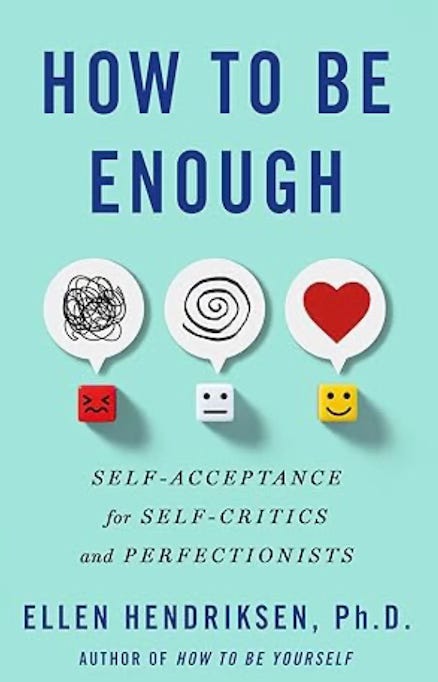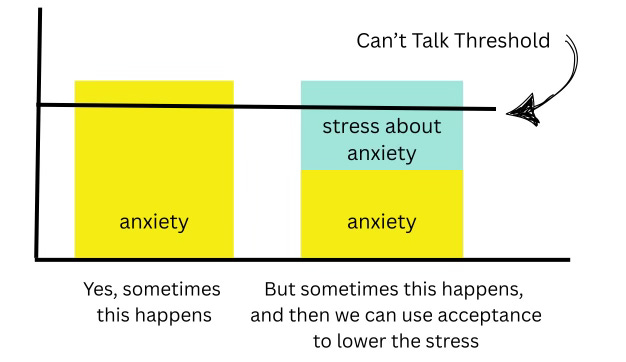5 Things to Try When Talking About Yourself Feels Impossible
Simple strategies to take the pressure off
Almost 100 reviews! Apparently that makes the Amazon algorithm do its magic. If you enjoyed How to Be Enough, posting a short review like “Loved the part on procrastination—full review eventually” would be amazing. (See what I did there?)
While you’re clicking on books, check out two hot-off-the press powerful new books!
Esteemed bereavement counselor John Tsilimparis’s Magic in the Tragic: Rewriting the Script on Grief and Discovering Happiness in Our Darkest Days redefines grief as a transformative experience.
Clinical psychologist Dr. Jennifer Caspari, who lives with cerebral palsy, helps readers with chronic health conditions cope effectively in a world not designed for them in You Are More Than Your Body: 30+ Evidence-Based Strategies for Living Well with Chronic Illness.
Now, on to this week’s newsletter!
Hi everyone!
Dear reader Rosalind asks how she can feel more comfortable talking about herself. She’s looking for love, which means going on dates. And going on dates means getting to know people, and, crucially, helping them get to know her. But here is Rosalind’s challenge, in her own words:
I always struggle to talk about MYSELF. Whenever someone asks questions about me—even something as simple as what I do for work or what I like doing for fun—I instantly clam up and want to shrink and hide. My mind goes blank and I can’t think. Which is weird because these should be easy to answer and aren’t exactly vulnerable questions. I end up just squeezing out the bare minimum with a one-word answer in the hopes that the spotlight can go away from me.
Going blank is a common experience; like Rosalind, we can’t think, much less talk, through the buzz of anxiety. Luckily, there are a number of things we can try:
1: Lower the pressure internally.
Clamming up often results from feeling overwhelmed by internal pressure. Consciously or unconsciously, we tell ourselves we have to do things correctly (or at least not screw things up.)
For example, we may hold ourselves to strict social performance standards. Our brain whispers to us: “You have to sound cool,” “Don’t stumble over your words!” “Girl, talk like a normal person.”
We may struggle to navigate internalized rules about talking about ourselves: "Stop making everything about you." “It’s tacky to draw attention to yourself.” “Be humble.”
We might unconsciously set too high a bar for what is acceptable to talk about. “He doesn’t want to hear about my adult piano lessons—that’s so cringe.” “What am I supposed to tell her about my boring office job?” “No one wants to hear me yammer on about my guinea pig.”
Finally, other people’s harmful past pronouncements may still be ricocheting through your brain, years after they were said to you: “No one wants to hear about that.” “You’re annoying.” “Nothing you say ever lands.” “You’re so awkward.”
Whatever thoughts are keeping you silent, challenge them. Even better, ask your therapist to help you challenge them: Am I holding my date to the same standards? Are the rules all-or-nothing—for example, do I really have to “add value” 100% of the time? When that high school mean girl told me I was awkward and weird, was she proclaiming truth or just saying stuff to be dominant?
2: Lower the pressure externally.
It’s easier to change the environment than the behavior. A classic example: rather than relying on willpower to resist scrolling through, say, smoothie recipes or AI stormtrooper vlogs, put your phone in a drawer.
Since our dear reader Rosalind asked about dating, let’s change the traditional face-to-face dinner date environment to something less intimidating.
Big asterisk: Don’t change the environment to avoid talking. You’re not going to propose swimming laps followed by silent meditation.
Instead of less talking, aim for less pressure. If sustained eye contact is your Achilles’ heel, suggest a walk, hike, or museum visit where you’re side-by-side rather than eyeball-to-eyeball. Or, if it’s easier to talk about yourself while focused on a mutual activity, consider something like a cooking class or paint-your-own pottery.
3: Use first-person language with a third-person mindset.
Focus on talking about a THING rather than YOU doing the thing. Let’s take the classic question, “What do you do for work?”
It’s easy to hear this as: What do YOU do? The spotlight is on you.
Instead, answer the question as if the spotlight was on your job: WHAT do you do? Tell your date, potential friend, or whomever you’re getting to know about the JOB.
You’ll still speak in first person—“I groom dogs,” “I teach kindergarten,” “I leverage strategic people-focused solutions for data-management synergy,” but in your mind, you’ll focus your energy on telling them about the job.
Adapt this for almost any topic. Re-interpret “What are YOUR hobbies?” as “What are your HOBBIES?” “How was YOUR vacation?” turns into “How was your VACATION?”
4: Go ahead and ramble.
This sounds counterintuitive. But squeezing out the shortest possible answer might be a safety behavior, which is exactly what it sounds like: a behavior we engage in to feel safe. But safety behaviors backfire. Giving the shortest possible answer reinforces the idea that talking about ourselves is dangerous; it’s like peering over a ledge and scrambling back over and over again. We never get the chance to learn we don’t fall.
If this sounds familiar, aim to increase your air time. In therapy, when a client’s goal is to talk more, we’ll do an exercise where they talk for 30 seconds, a minute, or two minutes straight simply to get used to talking for longer stretches. If they run out of things to say or go blank? Just repeat what was already said. The point isn’t quality, it’s quantity; it’s about getting used to speaking at length.
Of course, on a date you can’t set a timer for two minutes and repeat the same story until the beep. Save that for a therapy exercise. But you can still aim to increase the time you’re talking two- or three-fold, or even more. It will feel wrong at first, like you’re rambling or babbling, but will feel more natural over time.
If it doesn’t feel more natural over time, ask yourself, “What am I doing to save myself?” What other safety behaviors might be standing in your way? One at a time, drop the behaviors that are trying to keep you safe, but are actually standing in the way of learning how capable you really are.
5: Shift from “This shouldn’t happen” to “Eh, this is what happens.”
When we’re really anxious, we truly cannot think or talk through the buzz of anxious adrenaline. We freeze, panic, or shut down. At a certain point, we pass the “can’t talk” threshold. Take a look at the bar graph on the left.
But sometimes we get anxious about a social situation, and then we make things worse by telling ourselves we shouldn’t feel anxious, or that we’re bad or wrong for feeling anxious. When we layer guilt, self-criticism, frustration, or resistance on top of our anxiety, our body responds with an even greater threat response. And then? We can’t get a word out. Look at the bar graph on the right.
Therefore, rather than telling ourselves “I can’t feel like this,” or “This shouldn’t happen,” try shifting to “Welp, this is how I feel on dates,” or “Eh, this is what happens.”
This is acceptance. A classic metaphor tells us, “Instead of pulling harder in your tug-of-war with anxiety, drop the rope.”
To sum it all up, lowering the pressure--whether internally, externally, by taking the spotlight off you, by making space for perceived rambling, or saying “eh” to anxiety--creates space for something genuine to come through.
🔔 Subscribe and join 8,000+ readers who are learning to be kinder to themselves without lowering their high standards. Hey, there’s a subscribe button right there!
Be kind to others and yourself!












Thank you for this helpful article! And today I learned you have a new book?! ORDERED! I have gifted multiple copies of *How to be Yourself* to my coaching clients
Lowering the pressure internally & externally can change the whole ball game. We just need to understand that even if we blow up it doesn't matter that much in the long run, yeah some things matter a lot in the present moment but we just need not take ourselves seriously. Here we are on earth for a very finite amount of time and we need to feel pressure unnecessarily. I know all these things are way easier said than done but I was dealing with for the last 27 Years of my life, but now I am incorporating that okay let's see if it matters in a decade and most of things generally don't & yeah I am taking it easy on myself and life is all about taking risks and most of the times calculated ones , sometimes delusional ones.